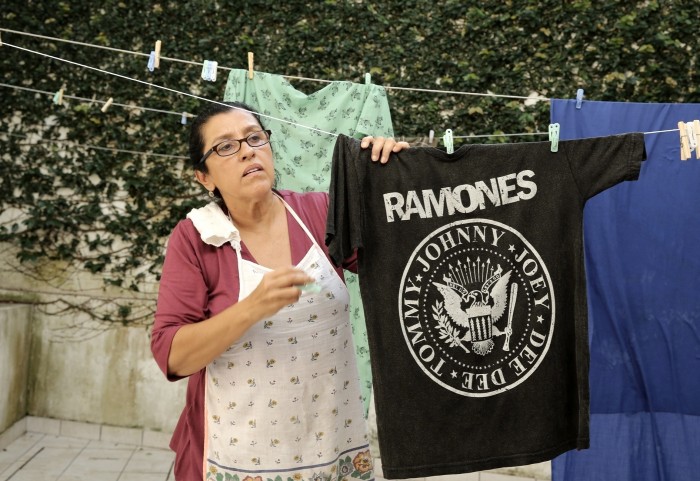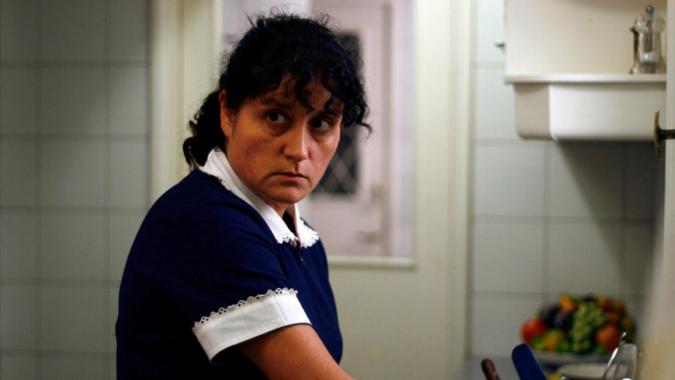Haunted by the remnants of colonialism and the advent of neoliberalism, Latin American societies today continue to face rampant economic inequality. Living parallel existences, the paths of those in the privileged class and the poor majority only intersect when interacting as beneficiaries and providers of services.
As the collective consciousness has started to grapple with these burdensome truths through a more progressive mindset, Latin American cinema of the 21st century has also become part of these conversations regarding the stories being told, if not yet the issue around who gets to tell them. Producing cinematic works is an inherently elitist art form because of the exorbitant resources and technology it requires.
Linked to class, in inextricable and pervasive ways, is race. Across the region, people from indigenous and Afro-Latino backgrounds are consistently the victims of a power structure that systematically marginalizes them. “Gender and class inequalities are, of course, not isolated from other problems. Race inequality is intertwined with those and other long-established forms of oppression,” author Maria Mercedes Vázquez Vázquez told Remezcla via email.
Her recently published academic book The Question of Class in Contemporary Latin American Cinema delves into the depiction of class struggles and the politics that fuel them in movies from Venezuela, Cuba, Mexico, Brazil, and Argentina. “Afro-Latin Americans and Native Latin Americans are still poorer than Latin Americans of European descent and the efforts that governments on the left of the political spectrum have made to address this imbalance in the twenty-first century are obviously still insufficient,” she added.


In Latin American films, an often recurrent figure that addresses the relationship between race and class is that of domestic workers – generally women – who not only cater to the quotidian needs of affluent families or opulent businesses for a less than ideal salary, but also assume significant emotional labor. They comfort crying children and act as a confidant to their bosses. Underpaid, underappreciated, and virtually invisible, their contributions and sacrifices are taken for granted as nothing more than a transaction in a power dynamic that never tilts in their favor.
On screen, Latin American filmmakers have tried to portray these ubiquitous figures with dignity, intellectual complexity, and agency over their lives beyond their employers’ desires. Still, the result cannot be anything more than an informed interpretation of what someone who has not experienced that life first-hand thinks of it. Dramatically there is value in these stories, but the gaze is always filtered through a set of eyes from someone in a more comfortable position in the social strata.
“Directors’ minds are limited by their material interests and social class,” said Vázquez Vázquez, “In the same way as my own social class inevitably conditions my approach to research.” In other words, whatever we do or create is informed by our experiences, even when we tell stories about others.

While middle-class characters are usually presented as multifaceted and conflicted in recent Latin American cinema, their lower class counterparts often exist solely as service providers: domestic workers, security guards, chauffeurs. Even if it’s obvious that their lives exist beyond these jobs, we only see them playing the part that is of relevance to their bosses. Some movies do manage to step away from such dismissive storytelling, in terms of class, with varying degrees of success.
Among those that contribute to the conversation is Alfonso Cuarón’s critically acclaimed Roma, in which a young live-in housekeeper is the focal point of the narrative. Inspired by Libo Rodriguez, the indigenous woman who worked for Cuarón’s family and acted as his childhood nanny in 1970s, the Oscar-bound black-and-white drama pays tribute to her in fictionalized form without limiting her world to the laborious daily grind at home. Cleo (Yalitza Aparicio), the protagonist, leads a full life: she goes out on dates, watches movies at the theater, has a laugh with a friend, experiences heartbreak, and feels uncertainty about the future.

Having said that, her story is inevitably constructed from Cuarón’s childhood memories and direct recollections from others, Libo included, but filtered through his understanding of them and his storytelling ambitions for the film. It’s her story told by him, with sincere admiration and loving intentions, but still by him.
However, Cuarón’s truly astounding film is never facetious about the grave issues of inequality in Mexico. The divide between those with money and those who work for pennies is ever-present in Roma, but he aims to close that gap, if ever so slightly, via the central friendship between employer and employee. Still, some may rightfully argue that his idealism comes from an inability to fully comprehend lower class hardships, even as he genuinely empathizes with them.
Similarly, Lila Avilés’ La camarista (The Chambermaid), another recent Mexican project that looks at women at the bottom of the ladder in the service industry, hopes to be a window into lives unseen. Eve (Gabriela Cartol), an astute maid at a luxurious Mexico City hotel, is a character with aspirations, social needs, and a strong sense of self.
But because of her socioeconomic status, Eve’s dreams are dependent on what guests and superiors decide she is worthy of: getting to keep an expensive dress from the lost-and-found, getting a promotion, or spending less time cleaning if occupants decide to be mindful of their mess. Women like Eve and her coworkers are an afterthought for those leading their lives in a different sphere of privilege, but Avilés’ work makes them visible in a deeply engaging manner – no doubt the product of having a female director behind the camera.
The result is a naturalistic and nuanced portrait of their shared struggles, joys, and conflicts, but written out of the director’s curiosity for a world she was not a part of. She observed hotel maids for an extended period of time to capture the physical demands of the job faithfully and witness their friendships and disputes, and that made for a beautifully rendered cinematic offering, but again assembled from her own ideas – an outsider’s point of view on these realities.

“Contemporary filmmakers are aware of their own social class and, there is a clear sense of guilt in some of their films,” explained Vázquez Vázquez, who believes that back in the 1960s and 70s, revolutionary middle-class filmmakers of the New Latin American Cinema filmed the underprivileged without focusing on themselves. Privileged artists working in the medium may feel the need to act as saviors through their cinema, which could say more about them than the people they are filming.
In a similar vein, two recent standouts from South America that address the same topic are Anna Muylaert’s Que horas ela volta? (The Second Mother) in Brazil and Sebastián Silva’s La Nana (The Maid) in Chile. The former looks at motherhood through the peculiar lens of a live-in maid, Val (Regina Casé), who has sacrificed time with her own daughter to raise her employer’s son. Val’s teenage daughter, who’s uncomfortable with what her mother does for a living, tries to persuade her to rebel against her kind oppressors. It’s the young woman’s view of her mother’s circumstances that eventually brings Val to recognize her own struggle.
Silva’s much more acid tale of household politics sees another live-in maid, Raquel (Catalina Saavedra), fight to the death for her position within the house, not only against the family members she is paid to serve, but also to fend off other housekeepers threatening to replace her. Raquel is deliciously entitled and unashamedly defiant to those who are supposed to rule over her – a refreshing and satirical take on the pent-up frustration of domestic workers. Making the maid the smartest and most caustic character in the story is a strong statement on Silva’s part, but in retrospect is more telling of his style than of the real abuses and challenges characters like Raquel endure.

Other notable examples in the long list of Latin American movies that attempt to shine a light on domestic workers and their conflictive relationships with the ruling class are Peru’s La teta asustada (The Milk of Sorrow), Chile’s La novia del desierto (The Desert Bride), and even Paraguay’s Las herederas (The Heiresses), all of which were developed, written, and directed by members of the upper crust. Their artistic value is not in question, but their motivations to deliver creative interpretations of experiences foreign to them are.
“If these films were made by the domestic workers themselves, I bet we would see something very different, but until we do not democratize filmmaking, we will not see it,” concluded Vázquez Vázquez. In this case, that which we are not seeing is likely what we all need to see the most.




